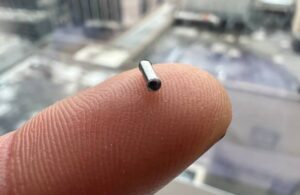
The researchers published their work in a paper in Advanced Science. They used an implantable nanofluidic device they invented to deliver CD40 monoclonal antibodies (mAB). The team calls the device a nanofluidic drug-eluting seed (NDES).
With the device — smaller than a grain of rice — they delivered immunotherapy directly into the tumor at a sustained low dose. This investigation took place in murine (rodent) models.
Researchers observed tumor reduction at a four-fold lower dosage compared to traditional systemic immunotherapy treatment.
“One of the most exciting findings was that even though the NDES device was only inserted in one of two tumors in the same animal model, we noted shrinkage in the tumor without the device,” said Corrine Ying Xuan Chua, co-corresponding author and assistant professor of nanomedicine at Houston Methodist Academic Institute. “This means that local treatment with immunotherapy was able to activate the immune response to target other tumors. In fact, one animal model remained tumor-free for the 100-days of continued observation.”
Why this drug delivery method?
The researchers say that immunotherapy offers promise in treating cancers without prior effective treatment options. However, because immunotherapy drug delivery takes place throughout the entire body, it causes many side effects. These can sometimes last an entire life, or at least very long.
By focusing on targeted drug delivery directly into the tumor, this method protects the body from exposure to toxic drugs. This can lead to fewer side effects and improved quality of life.
The NDES device features a stainless-steel drug reservoir containing nanochannels. These create a membrane allowing for sustained diffusion when the drug releases. Other medical technology companies offer intratumoral drug-eluting implants, the researchers say. However, those offer use over shorter durations. They aim for long-term, controlled and sustained release. The idea is to avoid the repeated systemic treatment that often leads to adverse side effects.
“Our goal is to transform the way cancer is treated. We see this device as a viable approach to penetrating the pancreatic tumor in a minimally invasive and effective manner, allowing for a more focused therapy using less medication,” said Alessandro Grattoni, co-corresponding author and chair of the Department of Nanomedicine at Houston Methodist Research Institute.
The Houston Methodist team has ongoing research for similar nanofluidic drug delivery technology on the International Space Station. Grattoni’s lab focuses on implantable nanofluidics-based platforms for controlled and long-term drug delivery. They also work on cell transplantation to treat chronic diseases.
Houston Methodist has additional research underway to look at the safety and effectiveness of the drug delivery technology. They hope to see this become a viable option for cancer patients “in the next five years.”

